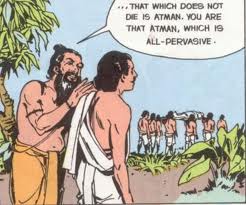 I was reading Lisa Renee’s latest column for the third time (deep, deep column) and noticed its use of Biblical references and it occurred to me that some (not many) Hindu readers might be puzzled by the continual use of the words “in the service of the Christ” or “Christ Consciousness.”
I was reading Lisa Renee’s latest column for the third time (deep, deep column) and noticed its use of Biblical references and it occurred to me that some (not many) Hindu readers might be puzzled by the continual use of the words “in the service of the Christ” or “Christ Consciousness.”
Most older people probably know what I’m about to say here but younger readers may not.
They may wish that the celestial, galactic, or spirit sources were speaking in their own terminology, instead of a Christian terminology.
In fact there’s an easy way to make the translation, if you’ll permit me to say so.
In a nutshell, where you see “in the service of the Christ,” read “in the service of the Atman.” Where you see “Christ Consciousness,” read “Atmic Consciousness.”
Consider the Hindu version of the Trinity. In my view, it’s not the Trimurthy of Brahma, Vishnu and Shiva. (1) The Trimurthy has no equivalent in Western religions that I’m aware of. They do not appear to recognize the cosmic forces being referred to.
I assert that Brahma, Vishnu and Shiva are really a personification of the gunas – rajas, sattwa, and thamas. Consider that both Brahma and rajas are creative in action; both Vishnu and sattwa are preservative; both Shiva and thamas are transformative.
Since the gunas are a subset of Shakti, by extension so is the Trimurthy. And that seems to coincide with the famous Vedic story of the gods being unable to lift a straw which Brahman caused to be immoveable, does it not? Brahman is superior to the gods. So is Shakti and the Atman.
I think the Christian Trinity of Father, Son (or Christ) and Holy Ghost is equivalent to the Hindu Trinity of Brahman, Atman, and Shakti. (For more on that see, Christianity and Hinduism are One” at https://goldenageofgaia.com/spiritual-essays/christianity-and-hinduism-are-one/.)
If I may paraphrase Jesus for a moment, he said that he (speaking as the Christ Intelligence) was one with the Father though the Father is greater than he. The same could be said of the Atman, could it not?
He said that he was the way, the truth, and the life, the doorway through which the sheep would enter. I believe the same could be said for the Atman.
He said he came from the Father, into the world, and now leaves the world and returns to the Father. Same could be said for the Atman. Admittedly it could also be said for the individual being and the Avatar. It could be said of all things, which came from the Father and return to It again.
Everything of a like nature that Jesus said, speaking as the Christ, could be said of the Atman. It is the treasure buried in a field, the Pearl of great price, the mustard seed that grew into a great tree, the measure of meal that leavened the whole loaf.
Emerson once published a poem in which he called God “Brahm.” When his critics protested, he suggested they substitute “Jehovah” for “Brahm” and their difficulty would go away.
Similarly here: substitute “Atman” for “Christ” and any perceived difficulty will probably vanish.
Footnotes
(1) Not Mahashiva or Mahavishnu, which is really a way of referring to Brahman.

